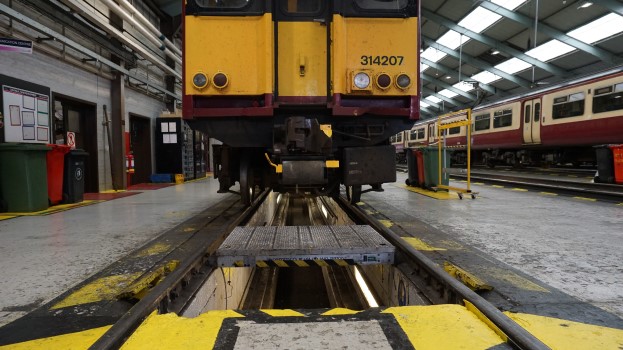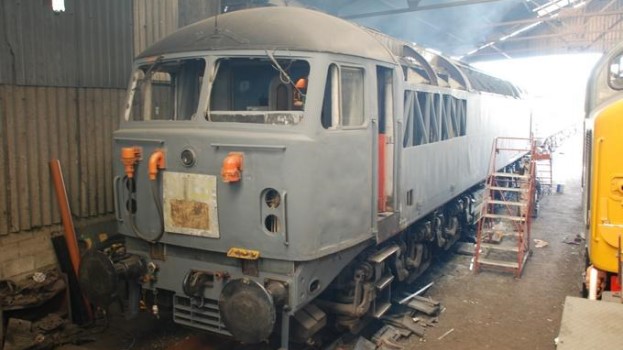Health concerns over build-up of dust at Crewe depot.

Above: Crewe traincare facilities
Concern
A reporter has raised a concern regarding exposure to dust at Crewe depot. This issue seems worse after rolling stock has been sanded down. The reporter believes this build-up of dust is due to two reasons.
Firstly, the extractor fans used to remove the dust – which are built into the sanding machines and on the ceiling – are underperforming.
Secondly, the reporter states that sanding does not occur in the designated preparation rooms, as there is not enough space to carry out this work. Instead it is carried out on the shop floor.
The reporter is concerned that the exposure to the dust may result in long-term health issues to employees and therefore asks if Arriva TrainCare (ATC) could consider:
- investigating the sanding machines and extractor fans to ensure they are functioning properly
- ensuring all preparation work including sanding is carried out in the designated areas
- hiring more cleaning staff to collect dust after sanding tasks have been carried out.

Above: train being primed during the respray process © Paul Miller
Arriva TrainCare's response
ATC carries out vehicle carriage refurbishment work at its Crewe depot and this is part of its core business activity. ATC outsources this work to a contractor to complete the entire process of preparation and paint to required specifications detailed by the customer. ATC is ultimately responsible for the management of the supplier and for all contracted activities at ATC sites.
The following key documentation has been provided by the supplier and is constantly reviewed during audit and inspection:
- process risk and Control of Substances Hazardous to Health (COSHH) assessments
- Safe Systems of Work
- safety plan
- staff competence records for all operatives working at the site
- other key company documents in the form of a pack.
Following the receipt of this report, the site was visited by the Health, Safety, Environment and Quality (HSEQ) manager, who initiated a thorough investigation, involving the depot manager and all applicable department managers, as well as senior representatives for the contractor.
Details of investigation carried out:
- A full operational review was conducted of the entire sanding and flatting operation conducted at the Crewe depot including supporting documentation.
- Interviews were conducted with management from within the heavy maintenance function and also personnel involved in the sanding activity. This was undertaken to understand exactly how the current process was being conducted.
- Process risk and COSHH assessments, Safe System of Work, equipment used for the sanding, flatting and preparation of vehicles and the working environment were all reviewed. Some tasks were found not to be robustly detailed within the risk assessment and a number of key control measures were missing.
- The investigation also identified that some processes were found to be not as effective as required by our business procedures or regulatory requirement. This created the potential for unsuspecting staff to inadvertently encroach on the activity when it was being conducted.
Actions taken as a result of this report:
- The process risk assessment and safe system of work has been updated following review of the current operation.
- New environmentally friendly equipment has been procured by the contractor to further reduce the build-up of debris during the preparation work.
- The main bulk of the vehicle preparation, sanding and flatting activities will now be conducted during the silent hours, i.e. when all workshop staff have finished work for the day or at weekends.
- Additional extraction has been procured by the contractor that will be used for preparation, sanding and flatting activities conducted at the site to further reduce the residual effects of the process.
- ‘No entry’ signage is to be displayed in all areas by the contractor during vehicle preparation work.
- Safety barriers are to be erected in the immediate vicinity to prevent personnel from walking into preparation areas.
- A majority of the paint spraying, and carriage preparation activity will be conducted within the dedicated paint or preparation booths.
- If there is a need to work outside of these parameters, this work must be authorised and conducted during the silent hours, when most of the engineering staff have finished for the day and have left the building or at weekends and are to be carried out in controlled conditions.
- Clean-up of the residual dust is to be carried out to ensure this does not create an environmental concern.
- Minor touch-up tasks will be conducted in supervised areas only, with the portable extraction local exhaust ventilation used as well as the above listed control measures.
- All equipment used to conduct the activity is to be inspected before use and any defects reported and repaired with any defective assets quarantined from use by IAW safety management procedures.
- All equipment is to be maintained and inspected in accordance with relevant regulations.
- The contractor has briefed all their staff of the importance of working in accordance with business procedures.
- The process will be monitored and audited as part of the ATC internal audit programme.
- Air quality monitoring is to be carried out around the heavy maintenance activity in order to assess the effectiveness of the control measures implemented.
Find out more
Tags
- Unsafe Practices
- Person's Environment
- Rolling Stock
